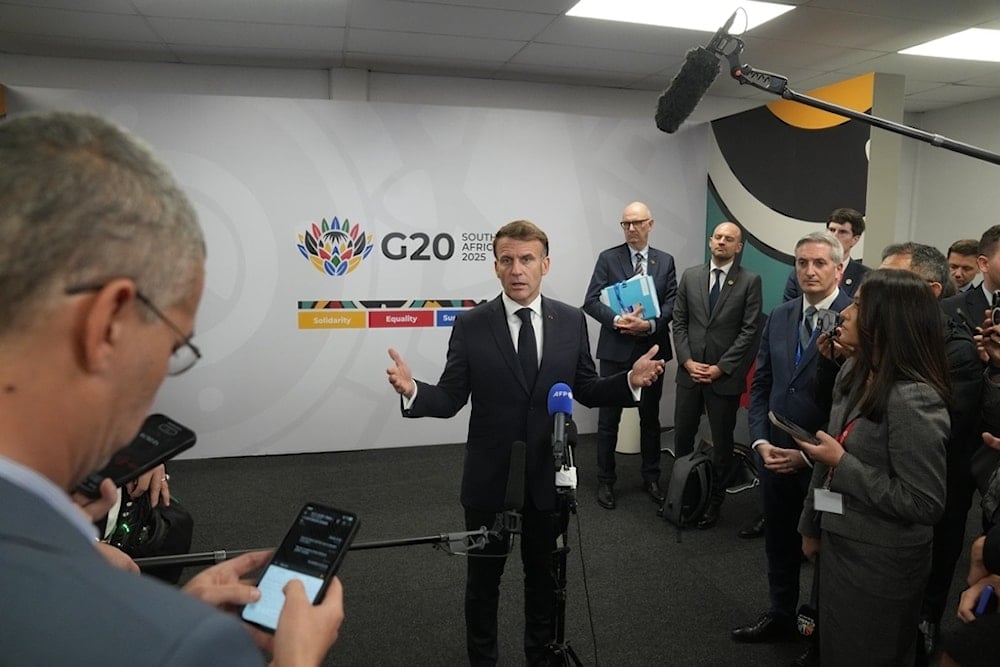Trump's Ukraine plan needs more work: Macron
Macron rejected key elements of Trump's Ukraine peace proposal as overly aligned with Moscow, while Kiev pushes for major revisions and the Kremlin signals support for the original draft.
-

French President Emmanuel Macron speaks to the media at the end of the first day of the G20 leaders' summit in Johannesburg, South Africa, Saturday, Nov. 22, 2025 (AP Photo/Thibault Camus)
French President Emmanuel Macron signaled firm reservations on Tuesday over US President Donald Trump's newly unveiled 28-point peace initiative for Ukraine, arguing that the proposal cannot be accepted in its current form by Kiev or European partners.
Speaking to RTL radio, Macron said the document, which surprised officials in Washington, Ukraine, and across Europe, includes elements that lean heavily toward Moscow’s preferences. While he acknowledged the effort as a step toward ending the war, he insisted that several provisions require substantial revision.
"It's an initiative that goes in the right direction: towards peace. However, there are aspects of that plan that deserve to be discussed, negotiated, improved," Macron said. "We want peace, but we don't want peace that is effectively a capitulation."
The French leader added that Ukraine must retain full agency over decisions involving its territory. "He added that only the Ukrainians could decide what territorial concessions they are ready to make." He further questioned the underlying balance of the US proposal: "What was put on the table gives us an idea of what would be acceptable to the Russians. Does that mean that it is what must be accepted by the Ukrainians and the Europeans? The answer is no."
Peace Tensions
Macron’s concerns mirror broader unease in Kiev and Brussels about the substance of Washington’s draft. The plan, which would cap the size of Ukraine’s armed forces, bar NATO bases or membership, and give Washington certain controls over frozen Russian assets, is widely seen as reflecting conditions more favorable to Moscow than to Ukraine. Some leaked provisions suggest a freeze of the current front lines and a long-term limit on Ukraine’s military posture, terms that Ukrainian officials fear would lock in Russian territorial gains and leave the country vulnerable to future coercion.
Ukrainian President Volodymyr Zelensky has so far neither dismissed the initiative nor accepted its central concessions. He has warned that Ukraine "will not accept peace that amounts to surrender" and insisted that the aggressor "must pay fully for the war he started," including through the use of frozen Russian assets. Ukrainian negotiators have been working with US officials to revise sections of the proposal, though Kiev maintains that any settlement must preserve sovereignty, security guarantees, and the country’s strategic independence.
Strained Talks
Negotiations between Washington and Kiev are ongoing, with both sides attempting to modify the plan into a version Ukraine could live with, a process that risks pushing the document further away from what Moscow would accept. US officials say the talks remain active, but several European governments are concerned that the initial draft was presented without sufficient consultation and could pressure Ukraine into a deal on unfavorable terms.
For its part, the Kremlin has openly welcomed the original draft as the only "realistic" basis for talks, signaling that the plan, in its initial form, aligns closely with Russian preferences. However, Moscow has not commented on the revised points now under discussion and has indicated it may oppose further changes if they dilute the concessions it views as essential.
Asset Sovereignty
One of Macron’s sharpest objections centers on proposed restrictions to Ukraine’s future armed forces and Washington’s intended authority over frozen Russian assets held in Europe. He insisted such matters fall within European jurisdiction, noting that "frozen Russian assets are in Europe, and Europe alone can decide what to do with them."
Macron also outlined France’s thinking on a security presence that could be deployed once hostilities cease. He described a multinational group positioned well behind the front lines to help stabilize post-war Ukraine. "There are British, French, Turkish soldiers who, the day peace is signed, so not in a context of war, are there to conduct training and security operations, as we do in certain countries on NATO’s eastern flank," he explained.
According to Macron, roughly 20 countries have already identified what roles they could take on "either in the air, on land, or at sea" as part of that broader effort to support Ukraine after a settlement.
Read more: Russia says FSB foiled Ukrainian sabotage plot of railways in Altai

 4 Min Read
4 Min Read









